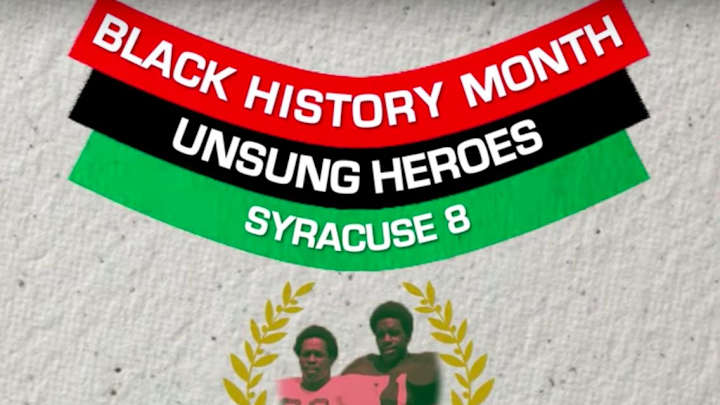Black History Month: The Syracuse 8 Risked Their Careers to Take a Stand for Equality

This February, Sports Illustrated is celebrating Black History Month by spotlighting a different iconic athlete or group of athletes every day. Today, SI looks back on the legacy of the Syracuse 8.
Like the Black 14 just a year prior, the Syracuse 8 took a stand against oppression and were punished in the process.
In 1970, nine African-American players protested against Syracuse University's discriminatory practices. (The media erroneously named them the Syracuse 8, not realizing that another injured player was a part of the movement.)
The nine were never directly punished, but none ever fulfilled their once-very realistic goals to play professional football as a result of their protest.
Gregory Allen, Richard Bulls, Dana Harrell, John Godbolt, John Lobon, Clarence “Bucky” McGill, A. Alif Muhammad, Duane Walker and Ron Womack sat out spring practices in order to advocate for a set of demands to end racial oppression in the program. Their four main demands were to gain access to the same academic tutoring services as their white counterparts; to receive better medical treatment for all their teammates; for starting positions to be entirely based on merit and to racially integrate the coaching staff, which had been all-white for more than 70 years.
Players like Alif Muhammad weren't allowed to take classes that would impede their football training, although Muhammad said that white players weren't hit with those same limitations.
The team doctor, Greg Allen alleged, was "hesitant to touch black bodies," he told WBUR in 2017.
"You know, there were two sets of latex gloves," he said. "And anything that could be avoided, was avoided. You're at a major university, and at the time one of the best football programs in the country, and you don't think enough of your players to get them expert medical care."
And despite the fact that Syracuse's administration systemically bragged about African-American football alumni like Jim Brown and Ernie Davis, players alleged that it was all lip service. There were implicit quotas on how many African-American players were given a chance to start. The coaching staff hadn't had a black coach—not a single assistant—since the 1800s up until that point.
The nine players received so much vitriol—from teammates alike—that there were rampant counter protests. A group of teammates even said that they would boycott if the players were allowed back.
Ultimately, one of their demands was superficially met. A black assistant coach was hired by the team, but he wasn't even listed as a coach on their program.
"I remember going to a meeting, and the coaches were meeting with a blackboard with X's and O's, and [the African-American coach] is sitting in the back of the room with his head down on the desk like he was sleeping," Muhammad told WBUR. "You talk about something that was hurtful. I mean it was like, 'Wait a minute. I sacrificed a career?' I felt deeply, deeply hurt."
So they kept protesting.
And it cost them their football careers.
Though the players were allowed to return to the university and the team, the majority of the nine never played again for Syracuse. Also, none of the players ever played a down in the NFL, though many were considered top prospects prior to the protests.
The Syracuse 8 sacrificed their careers in the name of principle. And the world is better off for it.
